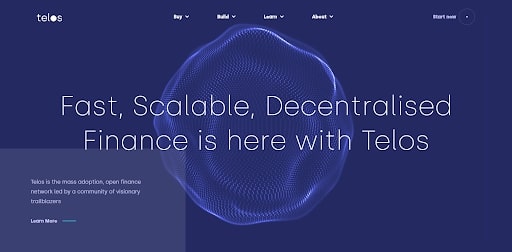The adoption of cryptocurrency and blockchain technology over the past decade has brought forth many innovations in multiple sectors. Blockchain is one of the most significant milestones of the new century, and many industries are beginning to take advantage. Although Bitcoin was the crypto vanguard, Ethereum is, to many people, one of the most useful.
One of the defining features of the Ethereum Network is that it allows developers to build new projects on its already existing chain. This has been one of its major driving forces leading to popular projects such as Uniswap, OpenSea, and 1inch, which all run on the Ethereum Virtual Machine (EVM).
This mass adoption has also brought a lot of problems. Frontrunning, high gas fees, and slow transaction speeds now plague Ethereum intermittently. This is where the Telos EVM steps in. Telos is a non-Ethereum based EVM that aims to solve a lot of the problems that traditionally plague Ethereum and other networks. Through the use of its EVM, Telos now gives a multitude of programs operating on the Ethereum chain unprecedented ease of migration. It aims to provide a truly unique user experience.
How Telos Outperforms Other Networks
The Telos EVM was built to fix problems faced by other networks. From the ground up, each aspect of it seems set to tackle a different problem inherent in other systems. Its EVM model works similarly to Ethereum’s but at the same time is differentiated from the original EVM. Its build, therefore, allows it to host a large number of programs from other chains making its compatibility unrivaled. Some of the problems Telos solves include:
Frontrunning
The advent of decentralized finance (DeFi), although welcome, also has associated problems. One of the most significant of these problems is frontrunning. Although frontrunning causes millions of dollars in losses for users, many have never even heard of it. This is because it usually occurs without their knowledge. A similar analog to this in traditional financial markets would be insider trading, where traders can profit from knowledge unavailable to the masses.
In terms of crypto, frontrunning refers to situations where miners or bots with access to information on pending trades can make profits based on this knowledge. The person involved can ‘jump’ ahead of a pending transaction on the queue, complete their transaction, and then profit on the difference between his buy and sell price. Although the attacker makes a profit on this, the user usually does not know of it.
Telos essentially puts a stop to this. By design, Telos has fixed transaction costs enabling users to mitigate the possibility of being exploited. There is also a strict anti-frontrunning rule, and any block producer caught defaulting is blacklisted. Telos’ transaction speeds also make it very difficult to take advantage of pending transactions as they are completed quickly.
Cardano, Solana, Ethereum, and other DeFi systems barely begin to address the front-running problem. In this respect, Telos is many steps ahead of its competition.
Transaction Fees
Yet another area where Telos shines its transaction fees. Telos is one of few platforms that can boast of having minimal gas fees associated with transactions. Native Telos transactions have no fees, and Telos EVM transactions function on a model similar to Ethereum’s native gas model.
Advertisement
Even though its model is based on its competitors’, Telos still manages to outperform it. Telos fees are expected to be less than 0.1% of the amount you would get on Ethereum for similar transactions. With Ethereum gas fees usually being relatively high, having transactions in Telos will over time save you hundreds if not thousands of dollars.
In this respect, Telos outperforms not just Ethereum but many other payment models. Its free transactions model is revolutionary, to say the least, and will continue to be the main attraction to its network. What price is better than free?
Block Times and TPS
Telos boasts one of the fastest block mining times of any network. Block mining times vary depending on the chain and a list of other variables but even when accounting for those, Telos still comes out close to the top. The amount of time taken to mine one block on telos is less than 500ms. Compared to other chains, the difference is night and day.
Ethereum, by contrast, takes between 12-15 seconds to mine each block on the chain. Even with this, there could still be delays due to mempool and miner pickup time, further increasing the gap between it and Telos.
Other competitors such as Binance Smart Chain and Polygon also fall short. Although they have better block times than Ethereum, they still fall far behind Telos in the race. This unprecedented block time means it can handle an astonishing 10,000 transactions per second(TPS), far more than Ethereum’s 14 TPS.
When it comes to transaction speeds, Solana is first on many lists. However, when compared to Telos, it seems to be potential versus reality. Although Solana claims a 50,000 TPS potential, its recorded TPS, according to solanabeach.io, sits just above 6,000, a far cry from its apparent ‘potential’ and significantly less than what Telos already does.
Popular contender Cardano also falls short when compared to Telos. Although it does outperform Ethereum in terms of speed, it is well below Telos and handles about 250 TPS.
Telos comes out on top when compared to other contenders and with a baseline of 10,000 TPS currently. It still has the potential to boost that figure astronomically with sharding. Its closest contender currently is Polygon which sits around 7,200 TPS, an undeniably impressive number but still less than Telos.
Versatility
In terms of versatility, Telos is unmatched. With its EVM, Telos can offer a home to a huge number of dApps. In a Q&A with the popular exchange, Kucoin, Justin Guidici, the head of product at Telos Foundation, stated that Telos is the only network to support smart contracts on EOSIO and Ethereum, two of the most used dApp tools.
Its compatibility with Solidity, Vyper, and EOSIO C++ means that for users looking for a new experience on Telos, migrating will be more accessible than ever. No other chain offers the amount of compatibility that Telos does. Telos is compatible with a record 95% of apps.
Advertisement
Even with Cardano’s opportunities, it still falls short in terms of offering the same functionality that Telos does. Compared to Telos, Cardano does not offer the same smart contract ability as Telos, and although it intends to introduce that in a future update, it comes up short currently.
Telos Is Saving Defi
DeFi has been making waves in the mainstream over the past few years, and with its increasing adoption, Telos stands poised to become a bastion of security and efficiency. The Telos team is dedicated and has been so since its inception in 2018, pioneering a new pathway for developers willing to make the switch.
The plethora of features Telos offers means that it will continue to be a force to be reckoned with, and as blockchain efficiency becomes more important, so will Telos.







